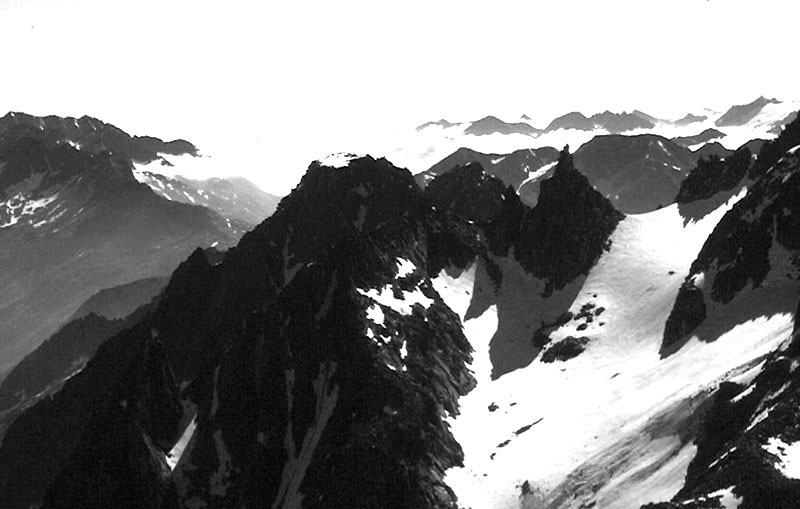August:
Moving Up into
Mountain Time . . .
(click on image to enlarge)

|
"Sufferings have not been seen,
Love has not been learned,
and what removes us in Death,
has not been revealed.
Only the song over the land
hallows and rejoices."
from Sonnet XIX (FIRST
PART),
from Sonnets to Orpheus
by Rainer Maria
Rilke
This week, an image
called
Looking East
—the Alps. Also: two new
translations from the German.
|
The guest poems for this week are two new English
translations from the work of the German
language poet,
Rainer
Maria Rilke (from the
Rilke website, a concise hyperlinked biography).
Moving Up into Mountain Time . .
.
Rilke wrote the Sonnets
to Orpheus
*
at his modest chateau in Muzot, Switzerland, during a
period
of intense activity in February of 1922. It was to be his last published
work. The sequence of 55
poems, all sharing the same basic form and divided into two parts, is
characterized by a marvelously
light and quick energy. Indeed, they seem filled with the exuberance of the
mountains in which they
were composed, where everything seems larger than life, colors brighter and
more radiant, and
streams faster and more clear.
This then is a poetry of praise, of the air I breathe, the meadow through
which I walk, the beauty
of a single windflower opening to receive the morning sun, and yes, of praise
itself:
XXVII [ZWEITER TEIL]
Giebt es wirklich die Zeit, die zerstörende?
Wann, auf dem ruhenden Berg, zerbricht sie /
die Burg?
Dieses Herz, das unendlich den Göttern gehörende,
wann vergewaltigts der Demiurg?
Sind wir wirklich so ängstlich Zerbrechliche,
wie das Schicksal uns wahr machen will?
Ist die Kindheit, die tiefe, versprechliche,
in den Wurzeln—später—still?
Ach, das Gespenst des Vergänglichen,
durch den arglos Empfänglichen
geht es, als wär es ein Rauch.
Als die, die wir sind, als die Treibenden,
gelten wir doch bei bleibenden
Kräften als göttlicher Brauch.
|
XXVII
[SECOND PART]
Does Time the Destroyer really exist?
When, on the mountain, will it bring /
down the fortress?
When will the demiurge overpower this heart
that belongs to the infinity of the gods?
Are we really so frightfully fragile
as Fate would have us believe?
Does the promise of childhood, the depths,
remain later quiet in the roots?
Ah, the ghost of that which is transient;
it passes through the guileless receptive ones
as if it were but a bit of smoke.
As that which we are, the driving ones,
still we are considered a custom of the divine
by the powers which do not change.
|
XIX [ERSTER TEIL]
Wandelt sich rasch auch die Welt
wie Wolkengestalten,
alles Vollendete fällt
heim zum Uralten.
Über dem Wandel und Gang,
weiter und freier,
währt noch dein Vor-Gesang,
Gott mit der Leier.
Nicht sind die Leiden erkannt,
nicht ist die Liebe gelernt,
und was im Tod uns entfernt,
ist nicht entschleiert.
Einzig das Lied überm Land
heiligt und feiert.
|
XIX [FIRST PART]
Even when the world swiftly changes,
as the form of clouds,
all things completed fall
back into the Primordial.
Above stride and change,
further and freer,
your prelude endures,
god with a lyre.
Sufferings have not been seen,
Love has not been learned,
and what removes us in Death,
has not been revealed.
Only the song over the land
hallows and rejoices.
|
| listen to Sonnet XIX [FIRST
PART]... German
/ English one recording # |

| view / print
Picture/Poem
Poster: Sonnets to Orpheus XIX (1) (86 K) | or
download
as PDF |
*
Orpheus is the musician of musicians
of classical Greek mythology. He is the one
whose magical art of the lyre has the power to charm the whole of
Nature—the trees,
rivers, stones and even the wild animals, into the silence of listening.
Son of Calliope,
the muse of epic poetry, and a Thracian river-god (in some versions of the
story Apollo),
Orpheus married the nymph Eurydice who was fated to die of a serpent bite
on her heel.
In his profound grief, Orpheus follows his beloved into the underworld, and
with the
sound of his lyre enchants the resident deities into consenting to her release.
The one
condition which Orpheus has to meet during the ascent back to the upperworld
is that
he is not to look back at Eurydice. In a brief moment of weakness, he does,
however,
look back, whereby Eurydice vanishes forever without a trace.
Rejecting all women in his sadness afterwards, Orpheus is later ripped to
pieces by the
Maenads. This then is the source of the famous image of Orpheus' lyre and
singing head,
floating off through empty space to the island of Lesbos.
| see also
the Rilke
Posters |
| listen to other recordings in English and German of twelve poems from
The Book of Images at
The Rilke
Download Page
(#
Includes
instructions) |
See other recent additions of new English translations of
Rilke's poetry,
together with
featured photographs at:
(36) July: Lily,
unfloding . . .
(35) July: The Rhythms of Work in
Poetry
See also a selection of recent Picture/Poem "Rilke
in translation" features at the Rilke
Archive.

|
See also another website
by Cliff Crego:
The Poetry of
Rainer Maria Rilke
|
a presentation of 80 of the
best poems of Rilke in
both German and
new English translations:
biography, links, posters
|
| back to
Picture/Poems: Central
Display |
|
Map
|
TOC:
I-IV |
TOC:
V-VIII |
Image Index
|
Index
| Text Only
| Download
Page |
Newsletter
|
About
P/P |
About Cliff
Crego |
Photograph/Texts of Translations © 1999 - 2001 Cliff Crego
(created:
VIII.12.2001)


